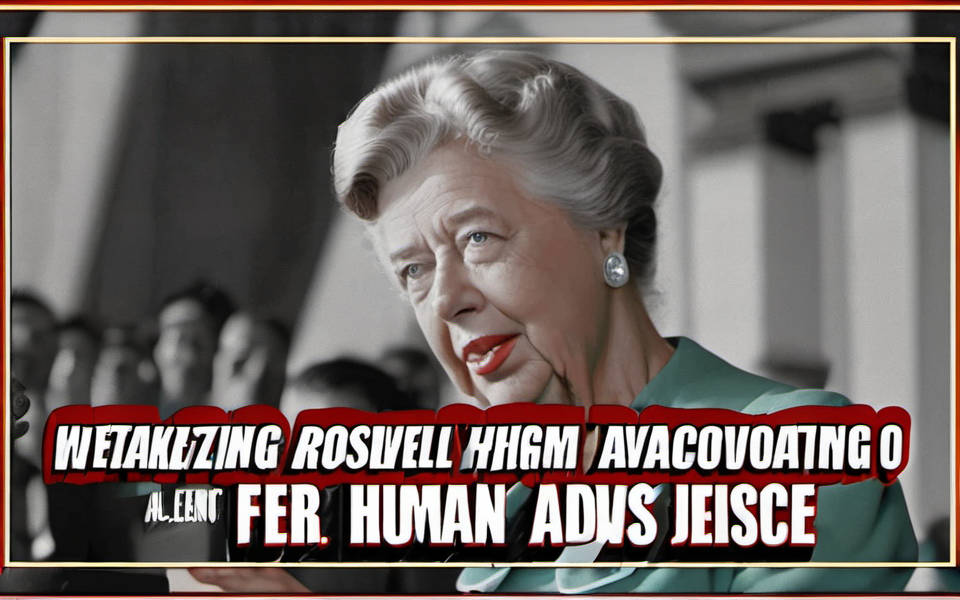What if we told you that one woman changed the world for millions of people, just by standing up for what she believed in? Read on to discover how Eleanor Roosevelt became a champion for human rights and social justice!
The Early Life of Eleanor Roosevelt
Born on October 11, 1884, in New York City, Eleanor Roosevelt faced tragedy early in life. Losing both parents by the age of ten, Eleanor was sent to live with her grandmother. This challenging upbringing shaped her resilience and empathy.
Despite her hardships, Eleanor attended Allenswood Academy in England, where she flourished under the mentorship of Marie Souvestre. This experience opened her eyes to social issues and the importance of global perspectives, setting the stage for her future advocacy work.
Meeting Franklin D. Roosevelt
In her early twenties, Eleanor met Franklin D. Roosevelt, who would later become the President of the United States. They married and had six children, but life quickly became more complicated. Franklin fell ill with polio, and Eleanor had to become a pillar of strength for her family. This time of adversity further honed her skills in leadership and compassion.
As Franklin’s political career advanced, Eleanor found her own voice in public service. She started by volunteering with the American Red Cross during World War I and soon branched out into various social causes. Her dedication to helping others only grew stronger from there.
The First Lady Who Broke All the Rules
When Franklin D. Roosevelt was elected President in 1932, Eleanor redefined the role of the First Lady. She didn’t just stand beside her husband; she stood up for the people. Flying in the face of traditional expectations, Eleanor hosted her own press conferences and wrote a daily newspaper column called “My Day” where she discussed social issues and offered her opinions—something unheard of at the time.
She traveled extensively, often alone, to understand the struggles of people across America. From visiting coal mines to meeting with civil rights activists, Eleanor took bold steps to connect with and advocate for marginalized communities. Her impactful actions helped to bring many of these issues into the national spotlight, forcing the government to take notice.
An Advocate for Human Rights
Beyond her role as First Lady, Eleanor Roosevelt was a formidable advocate on the global stage. After Franklin’s death in 1945, she didn’t slow down. Instead, she took on even larger roles, including being appointed as a delegate to the United Nations General Assembly.
One of her most notable achievements was chairing the UN committee that drafted the Universal Declaration of Human Rights. This groundbreaking document set a global standard for human rights and remains a cornerstone of international law today.
Eleanor knew that real change required action, not just words. She tirelessly campaigned for civil rights, women’s rights, and social justice, using her platform to speak out against injustice wherever she saw it. Her relentless dedication earned her the title of “First Lady of the World,” a testament to her widespread and lasting impact.
Legacy of Empowerment
Eleanor Roosevelt’s legacy continues to inspire advocates of social justice and human rights around the world. She proved that one person, no matter their background or circumstances, can make a significant impact by standing up for what they believe in.
Not only did she push for policies that promoted equality and justice, but she also empowered others to join the fight. Her words and actions set a powerful example, demonstrating that true leadership comes from empathy, courage, and a relentless pursuit of justice.
Today, we remember Eleanor Roosevelt not just as a First Lady, but as a tireless advocate whose influence touched millions and whose legacy continues to shape the landscape of human rights and social justice. Her story reminds us that with determination and compassion, we can all contribute to making the world a better place.
Conclusion
Eleanor Roosevelt was much more than a First Lady; she was a champion for human rights and a beacon of hope for many. Her life’s work paved the way for future generations to continue the fight for justice and equality. From her early challenges to her role on the global stage, Eleanor’s story is a shining example of how one person’s dedication and empathy can change the world.
So, the next time you feel like one person can’t make a difference, remember Eleanor Roosevelt and her incredible journey. She showed us that we all have the power to stand up for what is right and make lasting change. What will you do to follow in her footsteps?






